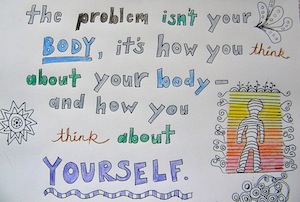An Inaccurate Body Image and Eating Disorder Recovery

There is hardly a man or woman in the modern world who doesn’t have some area of their body that they dislike. Body image issues are not just for those of us with eating disorders. The difference is, where the normal eater might think something like, “Oh, I should watch my portion sizes or go on a walk a few days a week,” those of us with eating disorders automatically scream “Run! Starve! Binge! Purge! Get rid of every ounce of fat on your body!” This is only exacerbated by the fact that many of us with eating disorders also have body dysmorphic disorder, meaning that we have an inaccurate view of our bodies.
Your Inaccurate Body Image Doesn't Fall Away as You Gain Weight
Of course, not everyone with an eating disorder needs to gain weight. However, as a recovering anorectic, I walked into the anorexia treatment center with the knowledge that I would need to gain XX pounds. One of the most frustrating parts of recovery from an eating disorder is surrendering to what your physical body is going to look like at the end.
The reality is if you want to recover, you've got to just let it go - your body shape and size are going to be determined largely by genetics and family history with some small amount attributed to diet and exercise. (What An Eating Disorder Relapse Can Teach You About Your Recovery). But if you're honoring your body by feeding it when it's hungry, stopping when it's full, and exercising in moderation, your body is going to settle where it is healthiest and most functional (often referred to as your "set point").
 And you don't get to choose that point. Would I like for my body to be its healthiest and most functional at the minimally acceptable weight for my body? Sure. Is it? Not even close.
And you don't get to choose that point. Would I like for my body to be its healthiest and most functional at the minimally acceptable weight for my body? Sure. Is it? Not even close.
Is that something I was happy about when I arrived at treatment? Absolutely not -- especially as I saw my meal plan increase on a nearly daily basis until not even my dietitian could deny that the amount I was eating was absurd.
Your Inaccurate Body Image Follows You into Recovery
You might feel like your body is changing on an hourly basis (I certainly did). That snack you just had definitely made your stomach fatter instantly. You swear that you can feel every bit of weight gain on every part of your body, even if your dietitian says you’re not gaining or even losing. They say body image is the last of the eating disorder thoughts to go, and in my experience (and the experience of others I’ve talked to), this is definitely true.
For months or even years into eating disorder recovery, you are going to look at your body with some amount of disappointment, or even disgust. But eventually, you will learn to live in your body. A lot of times, that means that you need to change the way you think about your body.
Accept That You Have an Inaccurate View of Your Body
I had to learn to talk back to my eating disorder in recovery. I know that my body is more than a random assortment of parts. So while I may not like what I see in the mirror, I have grieved the loss of my anorexic body and realized that was a body that was dying. My body now is a body that is living. And it feels a heck of a lot better. It took me years to get to that point, but now I look in the mirror and the thought process goes something like this:
Eating Disorder: “Ugh. I hate the way my stomach sticks out.”
Possible Wise Mind Responses:
- “It probably doesn’t stick out as much as I think it does. It has been proven time and again that I do not see my body accurately.”
- “My clothes still fit the same they did yesterday, so I haven’t gained weight overnight.”
- “I’ve seen other women walk with confidence in bikinis at the pool with stomachs that look just like mine, or maybe bigger.”
- “My stomach isn’t my problem. I’m just fixating on it because I want to ignore something else.”
- “So what? Who is really going to judge me on my stomach? And if they’re judging me based on that, do I really want them in my life anyway?”
The last one is particularly helpful to me. It took a long time to get there, but I finally learned to say “So what?” when the eating disorder was whispering lies in my ears.
My body and I seemed like we were separate entities. When I started to think of myself as a whole being, not just a body, I was able to gain respect for the things my body can do -- the experiences that I can only have in a healthy body.
How are you working on repairing your inaccurate body image in eating disorder recovery?
APA Reference
Hudgens, J.
(2013, August 8). An Inaccurate Body Image and Eating Disorder Recovery, HealthyPlace. Retrieved
on 2025, December 3 from https://www.healthyplace.com/blogs/survivinged/2013/08/body-image-and-acceptance-in-eating-disorder-recovery
Author: Jessica Hudgens
I am currently struggling to accept my set weight. I know I am going to be fine and will look the same and or better at that weight but I have so much underlying fear of gaining weight and the "naturally skinny" girls,at my school don't help. I have a little bit of a bigger build but I just hate it. I'm so sick of restricting and feeling worthless and want to recover mentally but physical changing scares me to death. How do I get over this?
I did not get any help to "recover". 1 1/2 years later. I am at a ordinary weight. Every day I can't stand the idea of getting dressed. I hate the way clothes feel on me and, I get dressed in the dark because I can't stand to see myself like this.
It is true that we miss our skinny selves. I go through trauma every day of the "healthy" me. Any suggestions how to deal with the mind/eye. unhappiness?
thank you so much for this post, this is very much something I can relate to and something I needed to see today! I often feel like I have few people in my life that I can turn to for support with my eating disorder, and when I do open up it's so frustrating when my fears and daily struggles are just atributed to my body dismorphia and brushed off as me "not seeing myself the way I really look". I still miss my anorexic body and I am having a hard time accepting my body for the size that it is when it is healthy. I'm so happy I found these posts from you and Patricia, it's very inspiring and comforting to know that it can get better and that recovery is possible. thanks again!
Thanks Jess for this piece. Accepting my set point was very difficult.
Accepting that I naturally fall between a size 8 or 10 without engaging in self-harming behaviors, is no longer a daily struggle, but for years, it was. This is who I am now and what I look like when I love myself. It's not perfect, but it's me.